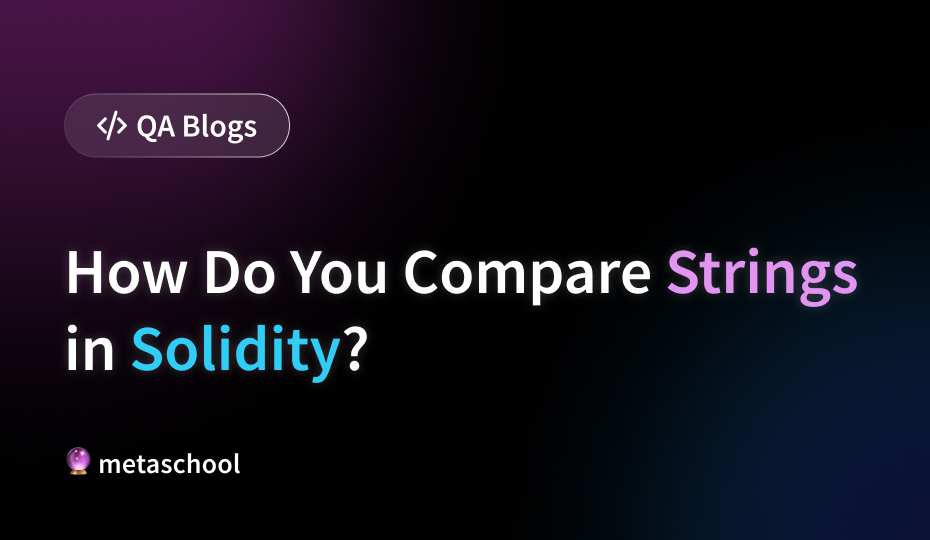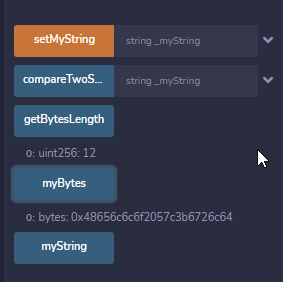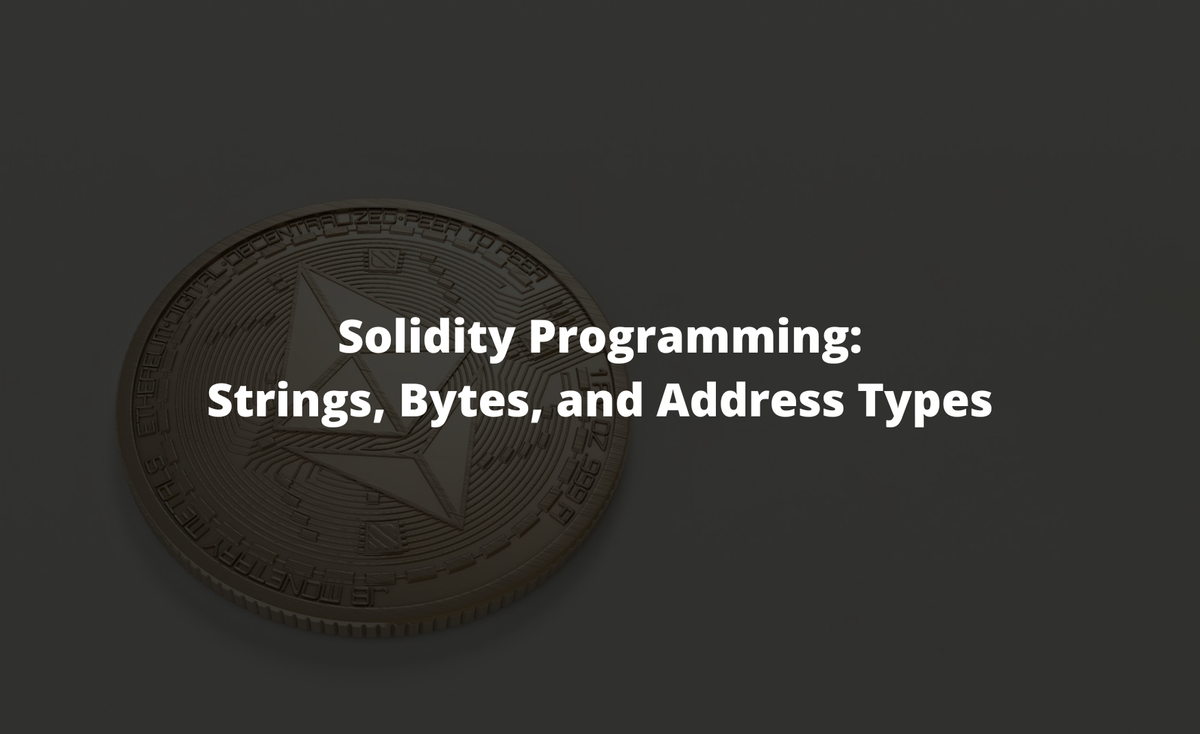Solidity String Comparison: A Complete Guide
Learn different techniques to efficiently and accurately compare strings in your Solidity smart contracts for robust data handling.
Learn different techniques to efficiently and accurately compare strings in your Solidity smart contracts for robust data handling.
Solidity handles string comparisons differently than some other programming languages. Instead of direct comparisons, you'll use a hashing function called keccak256 to determine if two strings are equal. This process involves converting the strings to bytes, calculating their respective keccak256 hashes, and then comparing these hashes.
Solidity doesn't directly support string comparisons like some other languages. To compare strings in Solidity, you'll need to use a hashing function like keccak256.
Here's how it works:
Convert the strings to bytes:
bytes memory stringABytes = bytes(stringA);
bytes memory stringBBytes = bytes(stringB);Calculate the keccak256 hash of each byte representation:
bytes32 hashA = keccak256(stringABytes);
bytes32 hashB = keccak256(stringBBytes);Compare the hashes:
if (hashA == hashB) {
// Strings are equal
} else {
// Strings are not equal
}Alternatively, you can use abi.encodePacked() before hashing for potentially better gas efficiency:
if (keccak256(abi.encodePacked(stringA)) == keccak256(abi.encodePacked(stringB))) {
// Strings are equal
}Keep in mind that while this method is generally reliable, there's a tiny chance of hash collisions (different strings producing the same hash).
This Solidity code defines a contract named StringComparison with two functions to compare strings. The compareStrings function converts input strings to bytes, calculates their keccak256 hashes, and returns true if the hashes match, indicating string equality. The compareStringsWithAbiEncode function achieves the same outcome by first packing the input strings using abi.encodePacked() before hashing and comparing. Both functions offer ways to check string equality in Solidity, with the second potentially being more gas-efficient.
pragma solidity ^0.8.0;
contract StringComparison {
function compareStrings(string memory str1, string memory str2) public pure returns (bool) {
// Convert strings to bytes
bytes memory bytesStr1 = bytes(str1);
bytes memory bytesStr2 = bytes(str2);
// Calculate keccak256 hash of each byte representation
bytes32 hash1 = keccak256(bytesStr1);
bytes32 hash2 = keccak256(bytesStr2);
// Compare the hashes
return hash1 == hash2;
}
function compareStringsWithAbiEncode(string memory str1, string memory str2) public pure returns (bool) {
// Calculate keccak256 hash of abi.encodePacked() result
return keccak256(abi.encodePacked(str1)) == keccak256(abi.encodePacked(str2));
}
}Explanation:
compareStrings function:
bytes(string).keccak256 hash of each byte representation.true if they are equal, false otherwise.compareStringsWithAbiEncode function:
abi.encodePacked() to pack the strings before hashing.keccak256 hash of the packed data.true if they are equal, false otherwise.How to use:
compareStrings or compareStringsWithAbiEncode function with the strings you want to compare.true if the strings are equal, false otherwise.Example:
string memory strA = "Hello";
string memory strB = "World";
string memory strC = "Hello";
bool areEqualAB = compareStrings(strA, strB); // false
bool areEqualAC = compareStrings(strA, strC); // true
Remember: While this method is generally reliable, there's a tiny chance of hash collisions. For most use cases, this is negligible, but it's something to be aware of.
abi.encodePacked() vs bytes(string): While both convert strings to bytes, abi.encodePacked() can be more gas-efficient as it avoids padding. However, it's crucial to understand its behavior with variable-length types to prevent unexpected results.keccak256 hash is astronomically low, it's not impossible. For applications requiring absolute certainty, consider alternative string comparison methods or libraries.keccak256: Other hashing algorithms like SHA-256 can also be used for string comparison. However, keccak256 is generally preferred due to its native Solidity support and gas efficiency.Remember to consult the official Solidity documentation and reputable resources for the most up-to-date information and best practices.
| Feature | Description |
|---|---|
| Direct Comparison | Not supported |
| Recommended Method | Hashing with keccak256
|
| Steps | 1. Convert strings to bytes (bytes(string)) 2. Calculate keccak256 hash for each byte representation 3. Compare the hashes |
| Alternative | Use abi.encodePacked() before hashing for potential gas efficiency |
| Caveat | Tiny chance of hash collisions (different strings producing the same hash) |
In conclusion, while Solidity lacks direct string comparison capabilities, hashing with keccak256 provides an effective and gas-efficient solution. By converting strings to bytes and comparing their respective hashes, developers can determine string equality. The use of abi.encodePacked() can further enhance gas efficiency. However, it's essential to acknowledge the slight possibility of hash collisions and consider alternative methods or libraries for applications demanding absolute certainty. Understanding these nuances empowers developers to handle string comparisons effectively and securely within the Solidity ecosystem.
 How Do You Compare Strings in Solidity? - | Comparing strings in Solidity can be a bit tricky due to the unique characteristics of how strings are stored.
How Do You Compare Strings in Solidity? - | Comparing strings in Solidity can be a bit tricky due to the unique characteristics of how strings are stored. How to compare two strings in Solidity | Contributor: Mubashir Ahmed Malik
How to compare two strings in Solidity | Contributor: Mubashir Ahmed Malik How To Compare Strings In Solidity? - KaizenGlobal | Want to learn how to compare strings in Solidity? Read here👉to explore hash functions, length,
and lexicographic comparison.✅
How To Compare Strings In Solidity? - KaizenGlobal | Want to learn how to compare strings in Solidity? Read here👉to explore hash functions, length,
and lexicographic comparison.✅ Simple way to compare strings in Solidity | SolidityTips.com | Comparing strings is something very common in programming languages but in Solidity we do it a little different.
Simple way to compare strings in Solidity | SolidityTips.com | Comparing strings is something very common in programming languages but in Solidity we do it a little different. Strings and Bytes - Become Ethereum Blockchain Developer | There are no native string comparison functions in Solidity. There is still a way to compare two strings: by comparing their keccak256 hashes. Extend the ...
Strings and Bytes - Become Ethereum Blockchain Developer | There are no native string comparison functions in Solidity. There is still a way to compare two strings: by comparing their keccak256 hashes. Extend the ... String Equality Comparison | solidity-patterns | A compilation of patterns and best practices for the smart contract programming language Solidity
String Equality Comparison | solidity-patterns | A compilation of patterns and best practices for the smart contract programming language Solidity Types — Solidity 0.8.29 documentation | Solidity does not have string manipulation functions, but there are third-party string libraries. You can also compare two strings by their keccak256-hash using ...
Types — Solidity 0.8.29 documentation | Solidity does not have string manipulation functions, but there are third-party string libraries. You can also compare two strings by their keccak256-hash using ... Solidity Programming: Strings, Bytes, and Address Types | In this article, we'll discuss a few more fundamental data types in Solidity programming: strings, bytes, and address types.
Solidity Programming: Strings, Bytes, and Address Types | In this article, we'll discuss a few more fundamental data types in Solidity programming: strings, bytes, and address types.